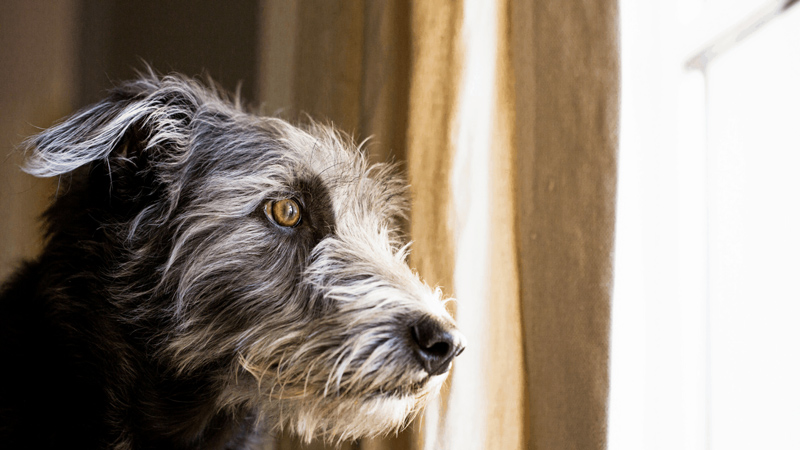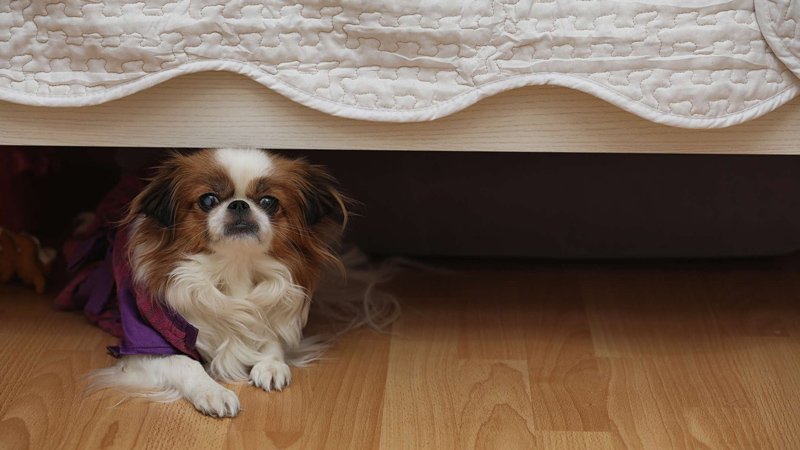Dog Anxiety: Why Is Your Dog Nervous?
In today’s fast paced, high pressured society, we can all get a little anxious at times. And, like people, our pets can experience anxiety, too. Here’s what you need to know about dog anxiety so that you can recognize it and help your dog should it occur.

6 Most Common Causes of Dog Anxiety
- Fear Anxiety can be from strangers, loud noises, unfamiliar environments and situations, visual stimuli, or a bad experience
- Separation Anxiety causes dogs to become anxious when separated from family, rehomed, or left alone
- Age Anxiety occurs when aging dogs experience confusion due to cognitive dysfunction syndrome (CDS), which is similar to Alzheimer’s Disease in humans.
- An illness or painful condition can increase dog anxiety.
- A history of limited social contact, neglect, and confinement may cause both fear based and separation anxiety. This can also occur in dogs that have spent time in a shelter.
- Some dogs will experience General Anxiety, and some breeds are more prone than others.
These Symptoms Can Indicate Dog Anxiety
Please keep in mind that each dog is different, and different types of anxiety may yield different behaviors. Talk to a caring professional, like the expert staff and veterinarians at Breckinridge Park Animal Hospital, to help you determine if your dog is suffering from anxiety. A veterinarian will also be able to rule out, or diagnose, any illnesses that may be causing the anxious behaviors.
- Aggression and growling
- Urinating and pooping in the house, especially when left alone
- Destroying furniture and household items
- Depression
- Drooling and panting
- Barking more than usual
- Restlessness and pacing
- Repetitive behaviors
- Trembling, tail tucking and fidgeting
- Avoiding eye contact and interaction
- Excessive licking
Once you have discussed the symptoms of dog anxiety with your veterinarian, it is time to evaluate possible treatments to relieve the stress your dog is experiencing. Again, your veterinarian is your best resource for accurately identifying the type of dog anxiety, and also to determine possible causes, trigger and solutions.

Is your dog showing symptoms of dog anxiety? Call the expert veterinarians at (972) 690-6900 for help
Ways to Alleviate Anxiety in Your Dog
Training Strategies
There are some training strategies that can be implemented in order to help reduce dog anxiety.
- Counterconditioning is a training method for changing the way your dog responds to stimuli. An aggressive or anxious behavior is replaced with a more positive one.
- Desensitization is a method that slowly exposes your dog to the trigger. By repeating small intensities of exposure in a safe space, and rewarding good behavior towards the exposure, the dog’s anxiety can be lessened as he/she becomes desensitized to the anxiety trigger.
A patient, educated owner can perform some of these types of training methods, but you can also contact a professional dog trainer for additional help and guidance.
Natural and Medicinal Remedies
Some natural remedies include pheromone scents, aromatherapy, and thunder shirts. These remedies may be beneficial alone, or in conjunction with medications prescribed by your veterinarian.
If the level of dog anxiety is severe, it may necessitate the use of medications. Your veterinarian will guide you on which pharmaceuticals are the best solution for calming your dog. If medication is prescribed, it is important to follow up with your veterinarian as suggested in order to watch for side effects.
Which remedies are best for treating dog anxiety? Contact BPAH to find the right answer for your dog.
How to Prevent Dog Anxiety in Your Fur Baby
- Learn to read their cues and body language. By understanding when your dog is started to react to stimuli in a negative way, you can give them comfort and remove them from the situation, if needed.
- Introducing your dog to new places, people and experiences at a young age can help them become accustomed to a multitude of situations.
- Obedience training will develop a strong and trusting relationship between you and your dog, enabling him/her to socialize with a feeling of security and safety.
- Always give your dog proper nutrition and plenty of exercise and playtime. A healthy dog—both physically and mentally—will generally have less dog anxiety.
- Finally, if you know what triggers your dog’s anxiety, try to avoid those situations, if at all possible. If carpool line builds anxiety in your dog, leave him home when it’s time to pick up the kids. Why expose them to additional stress if it is not necessary?
Dog anxiety does not have to be a life sentence. You and your veterinarian can work together to lessen the causes and effects of anxiety, stress and their related behaviors.
Make an Appointment at Breckinridge Park Animal Hospital
If you think your favorite pet is experiencing dog anxiety, the caring staff at Breckinridge Park Animal Hospital can help. Call our friendly office at (972) 690-6900 to make an appointment. Our qualified veterinarians will diagnose your dog’s anxiety, and work with you to establish the best treatment plan. Call (972) 690-6900 or click here to schedule an appointment.
Breckinridge Park Animal Hospital serves the northeast Dallas suburban area. We provide the community with some of the best veterinarians in Richardson, Garland, Plano, Murphy, Wylie and Mesquite.
This information is not a substitute for professional veterinary medical advice. Prior to starting any new treatment or questions regarding an animal’s medical condition, always seek the advice of your veterinarian.

